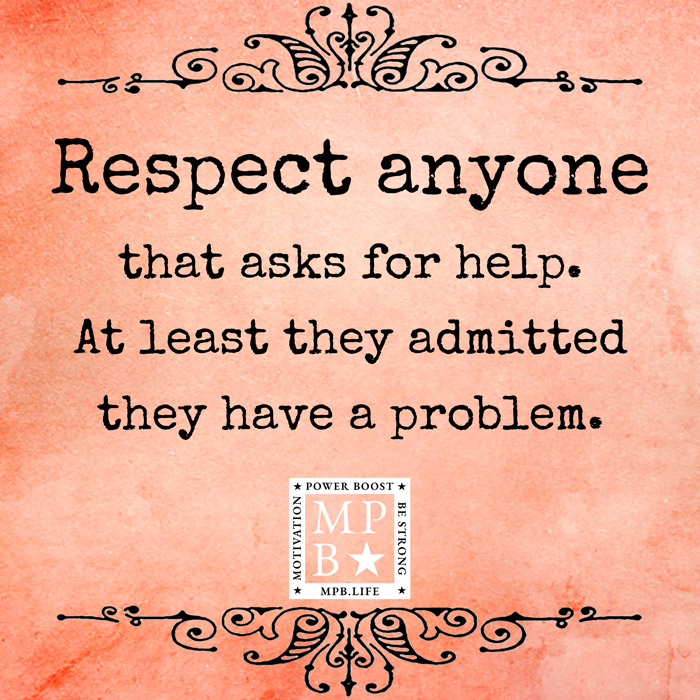
Respect Anyone That Asks For Help Graphic © motivationpowerboost.com
Respect anyone
that asks for help.
At least they admitted
they have a problem.
The Power of Vulnerability: Embracing the Strength in Seeking Help
Vulnerability is often perceived as a weakness, a chink in the armor of our carefully constructed facades. However, the truth is that acknowledging our struggles and reaching out for help is an act of profound courage and strength. When someone takes the brave step of admitting they have a problem and asking for assistance, they deserve our utmost respect and support.
Seeking help is not a sign of failure or inadequacy; rather, it is a testament to one’s self-awareness and determination to overcome challenges. It takes a great deal of introspection and honesty to recognize when we are facing difficulties that we cannot handle alone. By reaching out, we demonstrate a willingness to grow, learn, and improve ourselves.
Moreover, asking for help is a fundamental aspect of our shared humanity. No one is immune to hardships, and we all face moments when we need the support and guidance of others. When we respect those who seek help, we foster a culture of empathy, compassion, and understanding. We create a safe space where individuals feel encouraged to open up about their struggles without fear of judgment or stigma.
It is important to remember that seeking help is not a one-time event but rather a continuous journey of self-discovery and personal development. As we navigate life’s ups and downs, we may find ourselves in need of assistance at various stages. By respecting and supporting those who ask for help, we build a community of resilience and mutual support.
Furthermore, when we extend respect to those who seek help, we also break down the barriers that prevent others from reaching out. Many individuals hesitate to ask for help due to feelings of shame, fear, or the belief that they should be able to handle everything on their own. By celebrating the courage of those who do seek assistance, we create a ripple effect that encourages others to follow suit.
In a world that often places a premium on independence and self-sufficiency, it is crucial to reframe the narrative surrounding asking for help. It is not a weakness but a strength, a sign of emotional intelligence and self-awareness. By respecting those who take this brave step, we cultivate a society that values authenticity, vulnerability, and the power of human connection.
So, the next time someone reaches out to you for help, remember to approach them with respect, empathy, and understanding. Recognize the courage it takes to admit one’s struggles and offer your support without judgment. Together, we can create a world where seeking help is celebrated as a sign of strength and where no one feels alone in their battles.
Fostering a Culture of Mutual Support
Creating an environment where seeking help is respected and encouraged is not just an individual endeavor but a collective responsibility. By actively promoting a culture of mutual support, we can break down the stigma surrounding vulnerability and empower more people to take that courageous step.
One way to achieve this is by leading by example. When leaders, influencers, and public figures openly share their struggles and experiences of seeking help, they normalize the process and inspire others to follow suit. Their candor sends a powerful message that asking for assistance is not a sign of weakness but rather a sign of strength and self-awareness.
Additionally, educational institutions and workplaces can play a pivotal role in shaping this culture. By incorporating discussions about mental health, coping strategies, and the importance of seeking help into their curricula or employee training programs, they can destigmatize the topic and provide valuable resources for those in need.
Community organizations and support groups can also serve as safe havens for individuals to share their experiences and find solace in the knowledge that they are not alone. These spaces create a sense of belonging and foster a spirit of empathy and understanding, making it easier for people to open up and seek the help they need.
Furthermore, it is crucial to recognize that seeking help is not a one-size-fits-all approach. Different individuals may require different types of support, whether it’s professional counseling, medical intervention, or simply a compassionate ear. By offering a diverse range of resources and encouraging open communication, we can ensure that everyone has access to the specific help they need.
Ultimately, fostering a culture of mutual support is about building a society where vulnerability is celebrated, not shamed. It is about creating an environment where individuals feel empowered to take care of their mental and emotional well-being without fear of judgment or stigma. When we work together to achieve this, we not only help those in need but also strengthen the fabric of our communities, fostering a more compassionate and understanding world for all.
Related Inspirational Quotes
“A human being is not attaining his full heights until he is educated.” – Horace Mann
“Human beings are made of body and soul, and only the learned human can realize the reciprocal relationship between them.” – Maimonides
“Every human being is the author of his own health or disease.” – Buddha
“A human being is a single being. Unique and unrepeatable.” – Eileen Caddy
“He who is unable to live in society, or who has no need because he is sufficient unto himself, must be either a beast or a god.” – Aristotle
